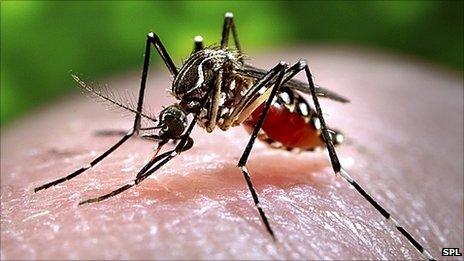Bacteria stop transmission of dengue fever
- Published

The researchers infected the mosquito Aedes aegypti with bacteria
Australian scientists say they have discovered a cheap and effective method of preventing the transmission of dengue fever.
They infected mosquitoes that spread the disease with bacteria that block transmission of the dengue virus.
When the resistant insects were released, they successfully interbred with wild mosquitoes and halted their ability to transmit dengue.
Details of the work are published in the journal Nature.
The researchers are hopeful that this could be a viable control for a disease that affects more than 50 million people worldwide every year.
According to the World Health Organization around one third of the world's population is at risk from dengue fever. The incidence and severity of this untreatable, mosquito-borne illness are increasing in many parts of the world.
Pesticides that kill the specific type of mosquitoes that carry the virus have been the most effective method of control to date, but resistance is rising.
Now a team of Australian scientists say that a simple bacterium called Wolbachia that only infects insects could stop dengue in its tracks.
Natural agent
Professor Scott O'Neill from Monash University, Melbourne, is one of the authors of the research.
"The approach is to use a naturally occurring bacterial agent - An intracellular bacteria that only grows within insects, and it's extremely common in the environment, up to 70% of insects naturally carry it."
After a series of laboratory experiments that proved the power of Wolbachia to restrict the abilities of mosquitoes to transmit dengue, the scientists then released several hundred thousand of them in Queensland in northeastern Australia.
Scott O'Neill explained that a critical aspect was getting the consent of the community to the idea of releasing even more mosquitoes into the environment.
"We spent a considerable amount of time preparing the community before we did the open field tests. A key component was an independent risk analysis undertaken by the CSIRO (Commonwealth Scientific and Industrial Research Organisation - Australia's national science agency). It indicated that over a 30 year time frame any potential for a negative risk with these experiments was considered negligible," he said.
"The mosquitoes were placed in containers, we filled up a van with these containers and drove around early in the morning in the neighbourhood and simply lifted the cover off these containers and the mosquitoes would fly out."
Within months, a wave of infection by the bacterium had spread to almost all the wild mosquitoes rendering them incapable of passing on dengue.
The scientists are uncertain as to why Wolbachia blocks the ability to transmit dengue, but Professor O'Neill said they have two theories: "The first relates to the immune system. The data suggests that the presence of Wolbachia boosts the immune system and helps the mosquito fight off the effects of dengue.
"Other evidence suggests that Wolbachia is competing for key sub-cellular molecules that the virus needs to replicate such as fatty acids - the jury is still out, it might be a combination of both."
The researchers say that further field tests are needed in countries like Thailand, Vietnam, Brazil and Indonesia where the disease is endemic.